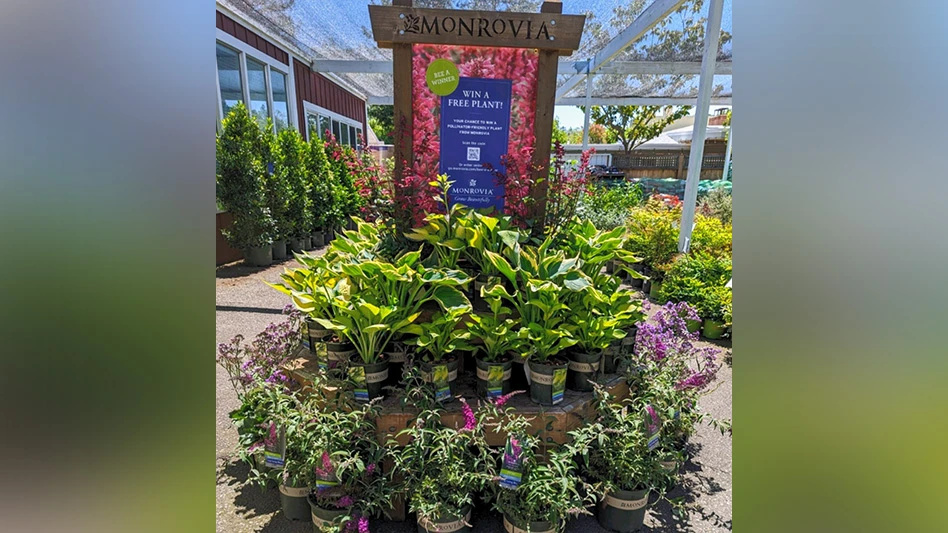 All independent garden center owners want to protect their investments. Whether the company is just starting out gaining customers, driving sales, and acquiring new assets such as equipment or computer systems, or has achieved a certain level of success and is interested in retaining the benefits of their success, they share a desire to protect what they have built.
All independent garden center owners want to protect their investments. Whether the company is just starting out gaining customers, driving sales, and acquiring new assets such as equipment or computer systems, or has achieved a certain level of success and is interested in retaining the benefits of their success, they share a desire to protect what they have built.
There is also the matter of protecting the business against a “perfect storm” scenario where a catastrophic occurrence takes place and could put the company’s health and welfare in jeopardy. From a vehicle accident involving employees, to a virus that wipes out your computer system, to an employee who decides to help themselves to the company’s bank account — all of these types of incidents put your organization at risk.
How do green industry professionals protect their operation from such scenarios? The answer is by being pro-active and getting to know what is really going on with employees, vendors, the competition and customers. It also helps to have a plan in place to respond to the challenges every small business faces.
Know where you’re vulnerable
If you ask small business owners what keeps them up at night you might want to grab another cup of coffee and a comfortable seat because it may take some time. From how to generate more sales, to where can they find good people, to what will the bank say at the next review meeting, there’s a lot that keeps small business owners tossing and turning.
Alex Glassay, managing partner of the Glassay Strategy, a Vancouver-based small business consultant, says the greatest vulnerability most small businesses have is the absence of a thoughtful and deliberate strategic business plan.
“Successful small businesses should have a clear understanding of who their customers are, what their customers need, and how they will go about satisfying their customers’ needs in a unique and compelling way,’ says Glassay. “Everything else — sales, marketing, HR and business structure — flows from this understanding.”
Small businesses need to be “unique and compelling” for two reasons: it allows customers to find the business, especially when there’s a lot of competition in the market, and it helps protect prices.
“If you’re the only garden center in town offering customized services, you can likely charge a higher price than other companies,” says Glassay.
Jeff Kear, co-founder of PlanningPod.com, an online business planning software program and a consultant to small business owners, says of all the departments within a company, human resources is most vulnerable since most small businesses don’t place a lot of resources or time in the process.
“Most companies simply want to hire good people who require a minimum of handholding/training and give them the freedom to do their job well,” says Kear. “They simply don’t have a lot of time to spare to do things like create employee handbooks or even conduct periodic performance reviews, so these are the things that often get overlooked.”
Overlooking core human resource elements can place companies in the vulnerable position. Not being able to retain key staff members, not having a plan in place to develop future leaders and enduring high turnover rates due to poor hiring methods all eat away at a company’s most valuable asset — its people.
Have a good plan
Knowing what your company is good at and what unique services it offers are two characteristics all successful businesses share. Focusing on taking your service expertise and delivering it to customers with first-rate service and competitive pricing are “must have” elements to building a successful, well-run business.
|
Points to remember A good protection plan for your garden center should include the following characteristics:
|
These seemingly simple concepts can go a long way to help small business owners and managers design a plan to bulletproof their organization from the threats of today’s business world.
Expanding into new markets and adding new services is part of serial entrepreneur’s DNA. However, the temptation to try and be everything to everyone is risky. Stick with what got you there and find markets for your existing product and service lineups before trying your hand at something which can take you, your managers, and employees out their areas of expertise and out on a long, precarious limb.
Famed Detroit automaker and founding member of the “Big Three” Ford Motor Co. learned this lesson in the 1990s and early 2000s when it aggressively expanded its holdings to include stakes in Jaguar, Aston Martin, Volvo, Land Rover and other ancillary businesses.
This buying spree spread the automaker’s research and development, engineering, marketing and management capabilities in a variety of directions and away from the company’s core focus.
As sales dropped and profit margins thinned, and the cost of legacy pension and healthcare programs mounted, Executive Chairman Bill Ford Jr., great grandson of founder Henry Ford, stepped in.
The younger Ford started “bulletproofing” the company through a series of divestitures and refocusing the company’s efforts back to its core — building well-engineered cars that consumers wanted to buy.
What can be learned from Ford and other companies big and small that have leaped with both feet into the expansion game? Don’t be afraid to jump, but make sure to not stray too far from the unique products, services and customer service focus that made you successful initially.
Expect the unexpected
Rarely does everything go as planned in the business world. There are always mid-course corrections that need to be made and unexpected financial, employee and customer situations that cross an owner’s desk on a daily basis.
From the unexpected resignation of a top manager to the loss of a major client, small businesses are constantly challenged to stay sharp.
Without a very powerful crystal ball, owners can’t plan for every business eventuality.The unexpected will happen, but there are ways owners can protect their organization.
Diversify your offerings
Dozens of small businesses have had to shut their doors within weeks after losing their big, cash cow customer. Make a strategic move to spread your revenue across numerous product categories and services, such as events, workshops and custom container creations.This way if one department, such as perennials, takes a hit, you don’t go down with the ship.
Your annuals department, including the ever-popular edibles and standard ornamentals, can help balance out the slower sales in other departments if you play your cards right.
Have money in the bank
You never know when hard times might hit, and one way to dodge a bullet — or absorb one, if need be — is to have three months or more of operating expenses in the bank. Three months is usually enough time for a nimble small business to regroup and seek new revenue streams and other remedies if required to alter course.
Know your customers as well as your competition
As often is the case, the success or failure of a business is directly related to the relationship it has with its customers. Knowing who they are, what services they need now and what services they will need in the future is critical to building a solid foundation that will protect your retail garden center.
Owners and managers will also benefit from studying their competitors. What are their strengths and weaknesses? What direction are they going with new products or services? Having this knowledge offers small businesses another level of protection.
Understand your industry and market
Being in the know with what is going on in your industry and local market is another important part of protecting your company.
Knowing the latest legal, regulatory and technological shifts taking place is a must for owners and their employees.
“If a small business stays on top of its customers, competitors and their business environment, its owner and managers can then carefully consider the appropriate direction the business should take to avoid risks and take advantage of opportunities,” says Glassay.
|
Create a simple, solid and effective plan to weather the storm A plan to weather the storm and protect your store from downturns in the economy or from an unplanned emergency is only as good as the people executing it. Owners and managers need to be in tune with employees, customers, vendors and themselves in order to successfully protect the assets — both financial and human — for the long term. Alex Glassay, managing partner of the Glassay Strategy, a Vancouver, British Columbia-based adviser to small business owners, says one of the most common mistakes owners and managers make when implementing a strategy to weather the storm is not listening. “Listen, especially to customers and staff who deal with customers on a daily basis,” says Glassay. “When [garden center] owners and managers listen to customers and respond to their needs, they’ll reward you with their continued business.” According to Glassay, another area where the process gets off track is when owners and managers over-complicate the process. “Complicated plans that take a long time to complete usually end in failure far more often than short-term, simpler plans,” says Glassay. “Simple plans are easier to remember, easier to execute, and easier to correct if they go off track.” Another mistake owners and managers make when it comes to developing a plan to protect the business is not attempting to develop a plan in the first place. Glassay points out that often, small business owners start their business because of a specific passion or skill. However as the business expands, they find that being able to grow or even maintain the business requires a deeper level of management skills they don’t have or necessarily feel they possess. Glassay says many small business owners find this task daunting and tend to ignore their own business’s needs. “They continue to work in their business and don’t find the time to work on their business,” he says. Jeff Kear, a Colorado-based consultant to small business owners, says another common misstep is trying to do too much at once. He says paring the plan’s elements down to manageable segments and staggering them over time will help you achieve a more solid, effective plan. Kear also points to the fact owners treat all items as equal in the process when in fact some are more important than others. For example, business development should always be a top priority because of the critical role it plays. “Without revenues, you don’t have much of a business to protect,” says Kear. “Prioritize those activities that are more critical to accomplishing your overall business goals and focus on establishing those first.” |
Jeff Fenner is a partner of Cleveland-based B Communications and a frequent contributor to Snow Magazine, a GIE Media publication.

Explore the January 2013 Issue
Check out more from this issue and find your next story to read.
Latest from Garden Center
- This Florida garden center's busiest days are in the fall, not spring. Find out how they do it
- Terra Nova Nurseries releases new agastache variety, 'Peach Pearl'
- The Certified Shopify Online Garden Center provides local retailers with ecommerce tool
- Meet the All-America Selections AAS winners for 2025
- Endless Summer hydrangeas and Suntory Senetti glam up Grammys red carpet
- Ball Seed releases 2025 edition of 'Thrive and Flourish' for landscape and garden retail
- American Floral Endowment's Fred C. Gloeckner Foundation Research Fund accepting grant proposals
- Floral Marketing Fund and CalFlowers partner to advance floral industry





